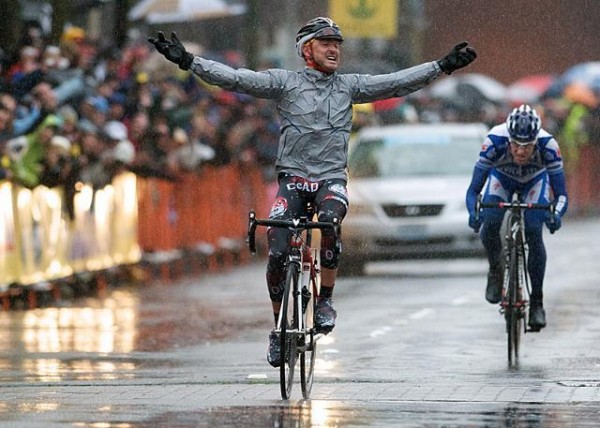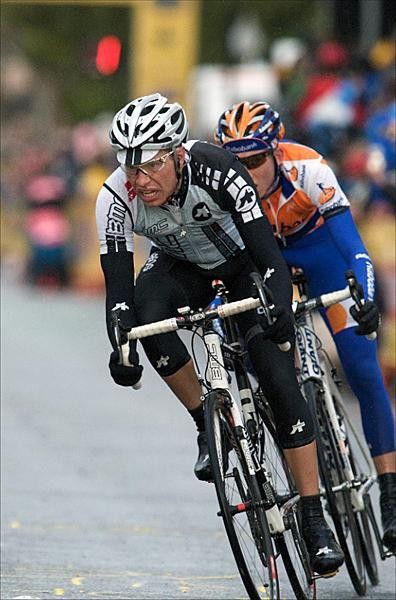American-Continental team success in the Tour of California
By Kirsten Robbins in Escondido, California Four years ago the Tour of California was designed as a...


By Kirsten Robbins in Escondido, California
Four years ago the Tour of California was designed as a platform to raise the bar in American racing. This year continental American-based teams invited to compete in the nine-stage event faired well against a world-class peloton nick-named a 'mini' Tour de France.
Rock Racing wowed the cycling world when Spaniard Francisco Mancebo took stage one and the most important win in the team's history. He went on to take a commanding lead in the King of the Mountain competition and the team continued to represent most of the event's decisive breakaways.
Unfortunately Mancebo crashed on the stage seven descent to the Rose Bowl and was sidelined with a broken thumb and a concussion. Despite the heavy blow Rudy Pevenage said he was pleased with his squad's overall success.
"I think we had a very good race this week," Pevenage said. "I think after Astana we had the second best team because we were involved in the race, in all the breakaways, in the jersey competitions and in the stage finishes. Being on the podium with a jersey would have been great but honestly, I could never have expected anything better from his team this week."
Team's OUCH presented by Maxxis, BMC and Team Type 1 also made a strong presence in the daily breakaways. In particular, Jeff Louder (BMC), Cameron Evans and Rory Sutherland (OUCH), Valeriy Kobzarenko (Team Type 1) spent more than 350 kilometres off the front of the peloton.
According to Louder, his squad hoped to be more involved in the stage finishes but a stage one set back forced them to revert to plan-B and going for long breaks. "We came into the season wanting to be there in the finales because last year we had a strong philosophy of being very aggressive," said Louder who lost more than 15 minutes at the end of stage one due to treacherous weather conditions.
Get The Leadout Newsletter
The latest race content, interviews, features, reviews and expert buying guides, direct to your inbox!
"It was a little bit of a disappointment that the first few days didn't go according to plan but we know this is a very big race and it was important for us to show ourselves as much as we could. Losing time freed me up for the rest of the race. I liked having that freedom. I spent at least 350-kilometres up the road."
Colavita-Sutter Home was ranked second in the previous year's NRC standings and brought a team to contest the three sprint stages. Its Argentinean sprinter Lucas Sebastian Haedo proved to be a formidable contender amongst the sprint heavy peloton placing with in the top ten placings in stages three, four and five.
"I would have liked to be on the podium here and I was close a few times," said Haedo. "The best sprinters in the world were here and it was a very good experience for me to go up against them."
Sebastian Alexandre, directeur sportif, commended Haedo's teammates for delivering him to a position of contention in the finale of each sprint. "We knew the first few teams were going to be very hard and we need to be conservative so that we had fresh riders for the sprint stages," Alexandre said. "We know that Seba is one of the fastest guys racing in America and we had a better chance to be in a podium position with him because of the fitness he has right now."
Team Bissell set the stage by placing five riders within the top 20 of the opening prologue. Time trial specialists Tom Zirbel, Jeremy Vennel and Ben Jacques-Maynes went on to impressive performances in stage six's 24-kilometre time trial held in Solvang. Jacques-Maynes also represented two significant breakaways in stages two and eight.
"I think we showed ourselves well in the time trial," said Glen Mitchell, directeur sportif. "We hoped to have a top five placing in the prologue but we are certainly pleased with both the prologue and the time trial. Having a core group of riders in the top end of the time trials was something that we expected."
Jelly Belly's break away rider Matt Crane brought his team some lime light when he earned the event's Most Courageous Rider jersey during stage five in Paso Robles. Crane was a member of a six-man break away that gained more than six minutes on the peloton.
"I've been looking forward to this race for a long time and to come out and represent Jelly Belly was huge," said Crane. "Its what I've been training for. When you have the best in the world racing a long side you its very special moment to be presented a jersey on stage."